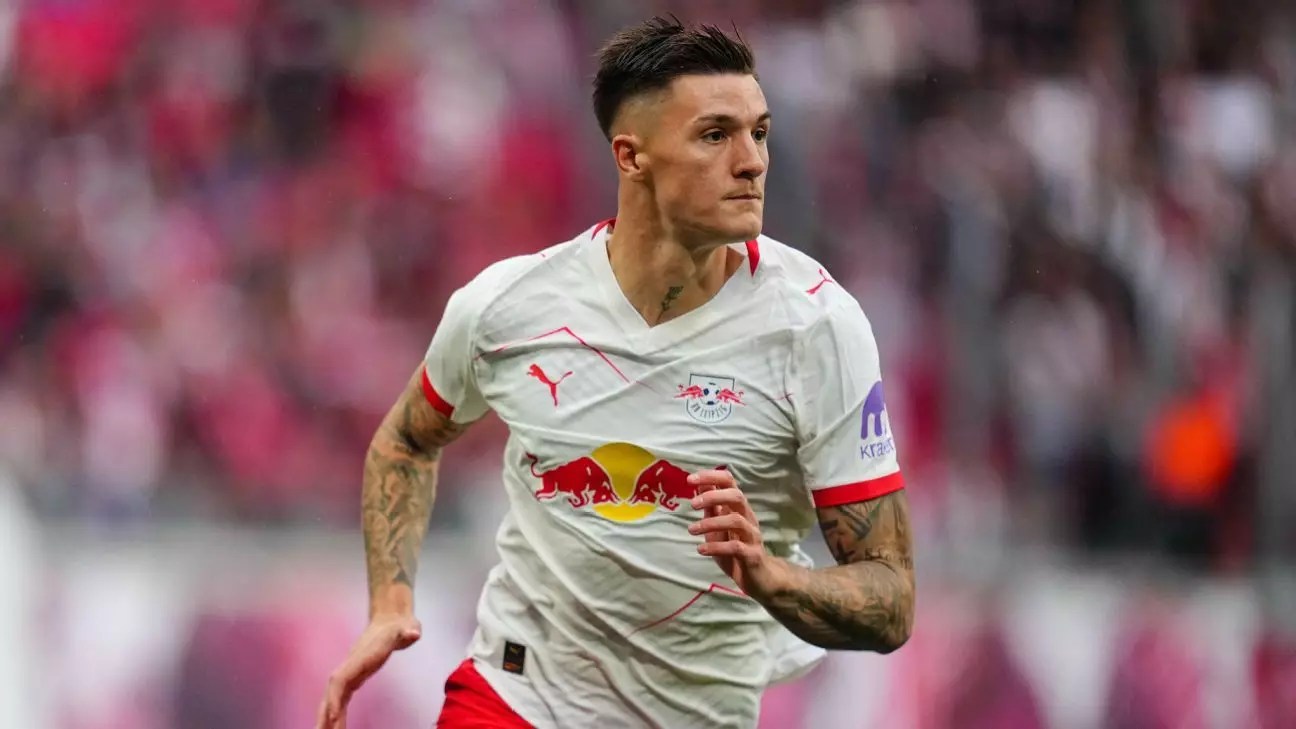In the ever-evolving arena of football transfers, Arsenal has captured the spotlight with their aggressive pursuit of Benjamin Šeško, a talented striker currently navigating the pressures of a potential move from RB Leipzig. According to reports from Sky Sport Germany, Arsenal’s sporting director Andrea Berta has been engaging in high-level discussions with Marcel Schäfer, the RB Leipzig chief. This proactive approach underscores Arsenal’s desire not just to strengthen their squad but to do so in a strategic and financially savvy manner. With Leipzig’s recent failure to secure Champions League qualification, they find themselves in a position that necessitates player sales to balance their budget, which means Arsenal could potentially land Šeško at a reduced price. Valued at around €75 million, signing a player of Šeško’s caliber would not only bolster their attacking options but also signal Arsenal’s renewed ambition to compete at the highest level.
However, the Gunners also have alternative targets in mind, such as Sporting CP’s Viktor Gyökeres, priced at €60 million. This situation illustrates the broader trend in football where clubs not only scout for immediate talent but also assess the feasibility of their financial environments. Arsenal’s strategy reflects an understanding of market dynamics—targeting players who might be available at a bargain could provide them the upper hand in an increasingly competitive transfer market.
Manchester City’s Tactical Maneuvers: The Nunes-Gibbs-White Exchange
Meanwhile, at Manchester City, a potentially intriguing swap deal involving Matheus Nunes and Morgan Gibbs-White is brewing, as suggested by reports. Nunes, who was brought in for an impressive £53 million from Wolverhampton Wanderers, has not lived up to expectations, frequently finding himself sidelined or playing in unfamiliar positions. Guardiola’s interest in Gibbs-White, who has thrived at Nottingham Forest, indicates a shift towards more dynamic and impactful midfielders, especially as they consider life beyond Kevin De Bruyne.
The possibility of using Nunes as leverage in this deal highlights the increasing trend of swap deals in football—a strategy that allows clubs to reshape their squads without the immediate financial implications of a transfer fee. This maneuver is not just a tactical shuffling of players but a reflection of a broader philosophy in football management that values adaptability and strategic foresight. Clubs that can identify when a player is underperforming and leverage their market value for a player who fits their system better are the ones likely to thrive in today’s ultra-competitive environment.
De Gea’s Next Chapter: A Potential Exit from Fiorentina
Elsewhere, AS Monaco is reportedly eyeing David De Gea’s potential release from Fiorentina as they search for a seasoned goalkeeper. De Gea, whose contract is nearing its end, has experienced a career of highs and lows, and a move to Monaco might represent a fresh start. Fascinatingly, it has been suggested that Fiorentina is keen on extending his contract, illustrating the nuanced dance between player performances and management decisions in a club’s hierarchy.
De Gea’s situation serves as a case study in player retention versus opportunity. While some clubs may wish to cling to established veterans, others recognize that the search for emerging talent and adaptable players often yields better long-term results. Each club’s approach to managing its roster will dictate its success in both domestic and international competitions in the coming seasons.
Manchester United’s Rebuilding Strategy: Future in Focus
Manchester United appears to be vigorously exploring their options for roster enhancements as well. Reports indicate that talks regarding Brentford winger Bryan Mbeumo are gaining traction. With manager Ruben Amorim envisioning Mbeumo as a long-term solution to possibly replace Marcus Rashford, it represents a key moment for United as they look to rebuild under new management. Mbeumo, who has had a breakout season, could indeed provide United with the offensive spark and versatility that has been missing from their arsenal.
Furthermore, the emphasis on youth and high-potential players in the league is evident. Mbeumo’s value, reportedly around £50 million, reflects the significant financial commitments clubs are willing to make on promising talents. The determination to recruit effectively speaks volumes about the strategic directions clubs are taking to ensure sustainable success rather than haphazard splurges on big-name players.
Wider Trends Across Europe: The Transfer Market’s Shifting Tides
Football’s transfer market is reflecting broader economic trends within and beyond the sport. Strategies that focus on value and player fit, coupled with savvy financial maneuvering, will become increasingly crucial as clubs navigate financial fair play regulations and shifting market dynamics. As evidenced by multiple clubs expressing interest in players like Nikolai Williams from Athletic Club and Granit Xhaka expressing desires to return to FC Basel, strategic thinking will dominate as clubs seek to balance their ambitions with fiscal responsibility.
The ongoing transfer discussions are not merely transactions but an intricate web of relationships, expectations, and future prospects. As clubs evaluate player performances and market opportunities, it becomes evident that the landscape of football is morphing into a more tactical and strategic battleground. This emerging paradigm affords those clubs with a sharper focus on sustained growth and adaptability a clear pathway to thrive in a volatile environment.


Leave a Reply